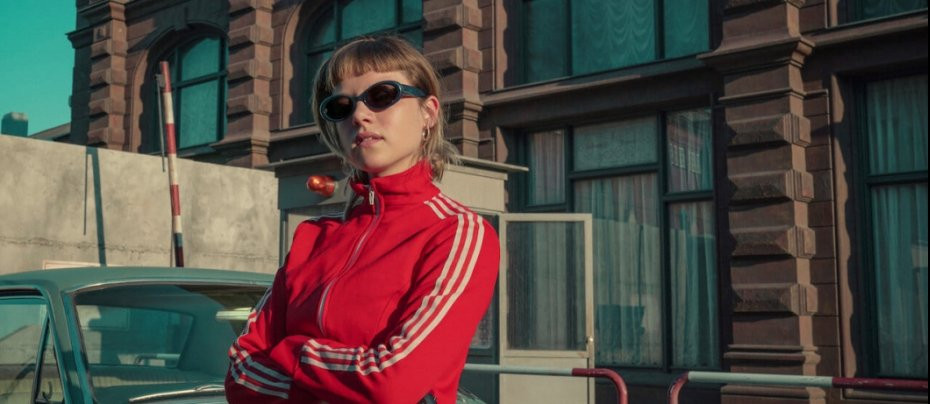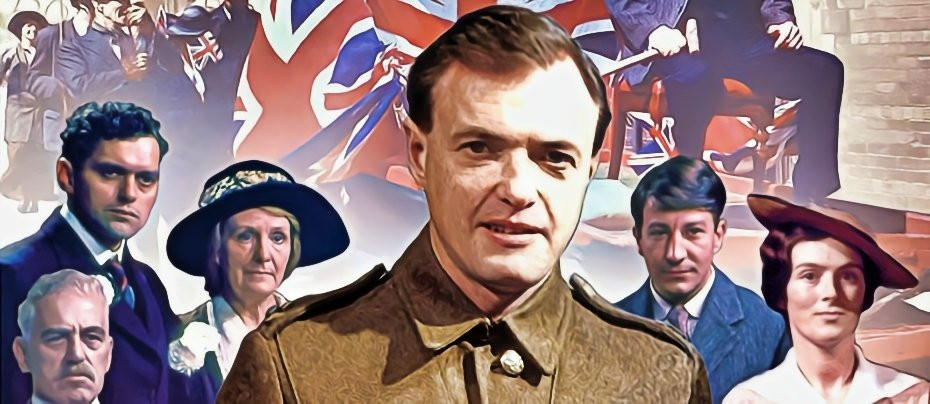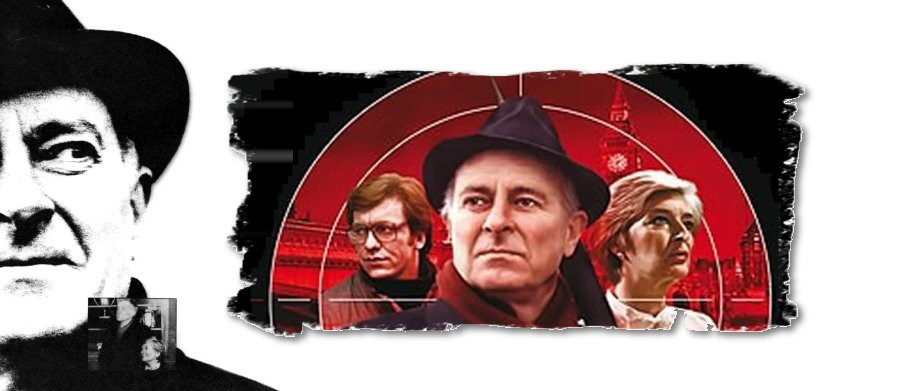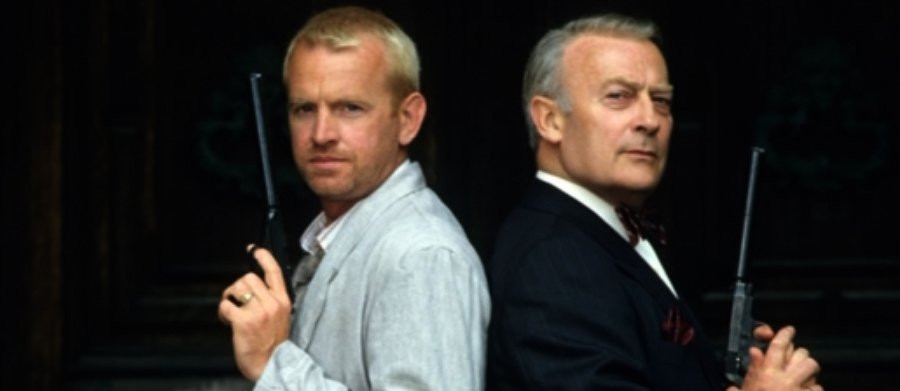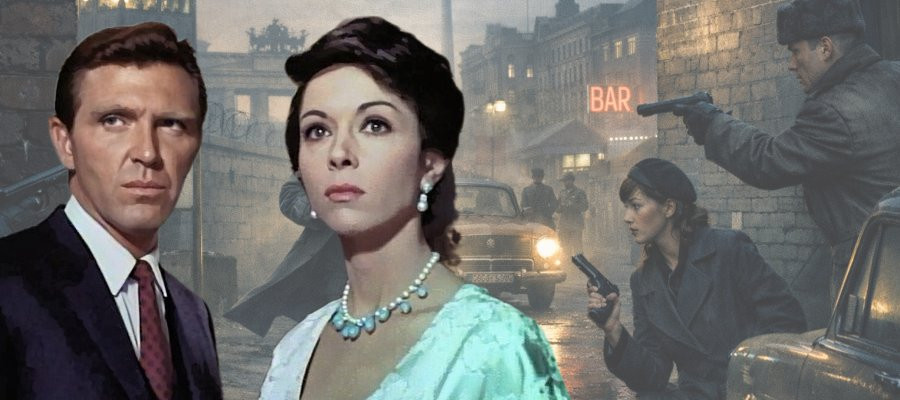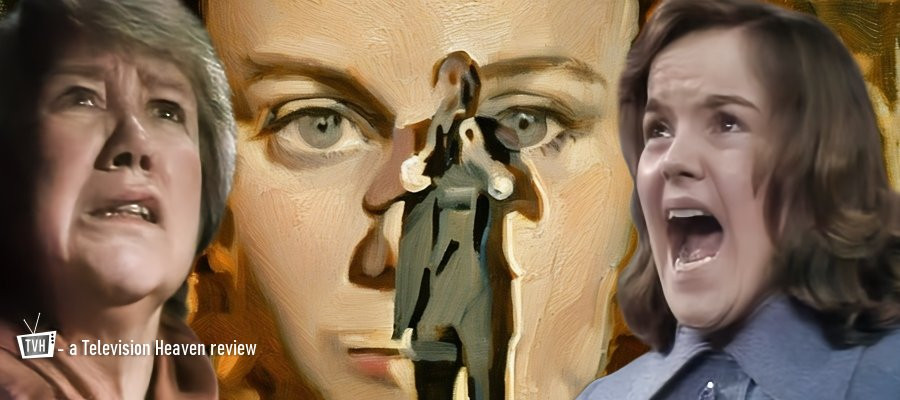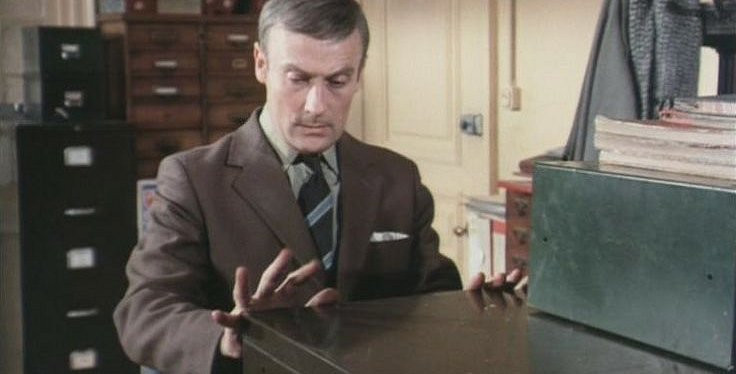
The Callan File
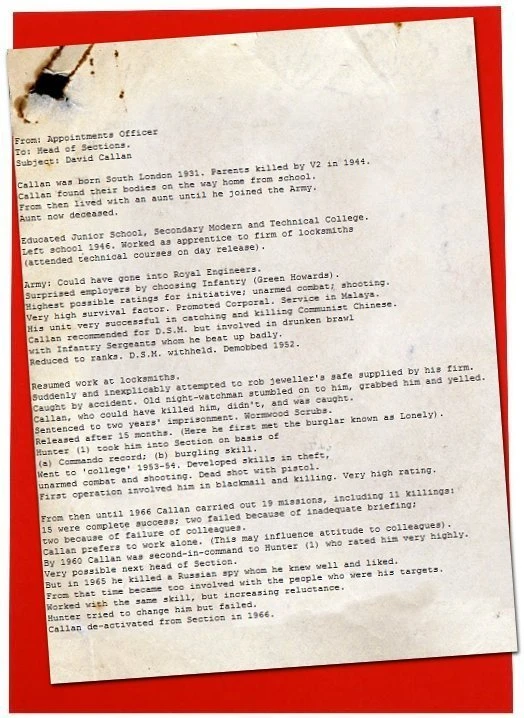
Mitchell's character, David Callan, was as far removed from the world of 007 as one could imagine.
Born in South Shields in 1926, the year of the General Strike, James Mitchell was the son of a union activist and self-taught intellectual who worked his way from shipyard fitter to city mayor. James was educated at South Shields Grammar School, graduated from St Edmund Hall, Oxford, and gained a Higher Diploma in Education from King's College, Newcastle, before working in repertory theatre, then going through a succession of jobs, from shipyard worker, travel courier and civil servant to 15 years as a teacher. A keen writer, his first play was performed by Cleadon Village Drama Group, outside South Shields. He broke into television in 1960 writing a one-off play for ITV's Armchair Mystery Theatre (Flight From Treason). The following year he wrote an episode of the US anthology series Kraft Mystery Theater and another single play, The Omega Mystery, as part of ITV's Armchair Theatre strand. Between 1961 and 1963 he contributed five scripts for The Avengers and a single episode of Z Cars. In late 1966 he submitted a script for Armchair Theatre called A Magnum for Schneider, about a secret government agent who is little more than a hired assassin. But although this was the exciting and romantic heyday of James Bond, fast cars, loose women and glamorous adventure, Mitchell's character, David Callan, was as far removed from the world of 007 as one could imagine.
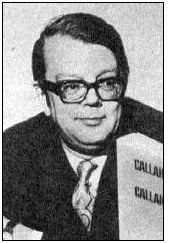
In his original treatment for the play, Mitchell set out the philosophy of espionage that defined the character: 'Espionage is about people. Essentially, it is about one man, and the effect he has on others. He is a man alone: the nature of his trade isolates him from his kind. He can never hope for lasting human contacts: abiding love, enduring friendship. His weapons are treachery, corruption, betrayal, and yet he himself must be immune from these. His weapons are theft, blackmail, murder. The tools of the trade are the knife, the gun and an icy courage no other man possesses. He is the Destroyer. His ordinariness is his protection. He is a highly-skilled cracksman, a master of unarmed combat, a dead-shot with a pistol. He is a killer. But he looks so much like everybody else, he is invisible. It is only when you know him well that you realise his strength, his menace - and his charm.'
Callan is a killer-but a reluctant one, prematurely and forcibly retired at the age of 35 to become a clerk, because of his tendency to question orders and to show clemency to the targets assigned to him. At the start of A Magnum for Schneider, Callan is offered his job back-provided he kills Rudolph Schneider, a bluff German working in London. The man Callan has to answer to is Colonel Hunter (codename Charlie), the ruthless head of a government security unit known as The Section. Hunter sits as judge and jury, ordering the deaths of men he has never met from the comfort of his office (secretly housed in a disused school), by transferring their names to a red covered file. By the end of the story, Callan has been placed in just such a file.
After serving with the British Army in Malaya from which he was discharged, with no career prospects in sight Callan decided to turn to crime. But he bungled his first attempt at burglary and ended up with a two-year stretch in Wormwood Scrubs. It was in 'The Scrubs' that Callan met Lonely, a habitual criminal and petty thief who had spent much of his adult life behind bars. Lonely, so-called because, when nervous, he "stunk like a skunk", was often treated with contempt by Callan. Nevertheless, Callan found him useful, and when Hunter gives Callan the Schneider job, "with no help from The Section" it's Lonely that Callan turns to for a gun (the Magnum of the title) to do the job with. Occasionally we're let into his confidence as, through voice-over, we hear Callan's innermost thoughts. We also learn that Callan is an avid collector of model soldiers from historic battles and has a passion for playing strategic war games in which his 'toys' re-enact famous conflicts. It's an interest shared by Schneider, who runs his own business from an office just down the hallway from where Callan currently works. A job arranged for him by, coincidentally, Hunter.
In casting the lead role for the play, the producers turned to an actor whose face was already well known on British television. Edward Woodward was a veteran of some twenty plus television shows. He had guest starred in a number of popular British series such as The Saint, The Troubleshooters and Emergency-Ward 10 and had been a semi-regular in a British drama series called Skyport, which ran for a single season in 1959. Throughout the sixties Woodward was kept gainfully employed in a number of TV productions, especially one-off plays that were shown under various umbrella titles such as Play of the Week and Armchair Theatre. 1965 and 1966 were especially busy years for him and by late 1966 he was planning his first family holiday in years when, just a few days before he was due to leave, the script for A Magnum for Schneider was put through his letterbox.
Woodward read the script and said he knew there and then that he had to do it, even though it meant cancelling the family holiday. The casting director for this episode of Armchair Theatre later told Woodward that she'd discovered he was going on holiday and knew that if she'd phoned him up and told him she had a script, he would turn it down. So working on the premise that an actor can never resist reading a script, she deliberately put it through his letterbox. Of Callan, Woodward told TV Times magazine prior to the Armchair Theatre showing at 1030pm on Saturday 4th February 1967, "He is no cardboard character but a very complicated one. Underneath his quiet toughness he's a loser with a sardonic sense of humour." Even before the Armchair Theatre production was aired, plans had been made for a full series - as the TV Times reported: 'Later this year, Callan will be featured in a series of one-hour thrillers, on which production starts in April.'
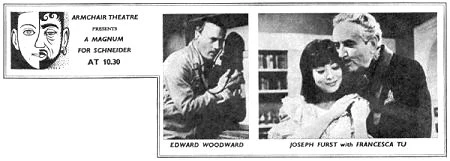
Story Editor for the AT production was Terence Feely, who had worked on a number of successful British TV series such as The Avengers and The Saint. It was Feely, working closely with James Mitchell, who would flesh out the character of Callan and develop future storylines for the full series. The producer was Leonard White who also worked on The Avengers, being responsible for the first forty episodes, which included the introduction of Honor Blackman as Cathy Gale. He produced some 165 teleplays - mostly commissioned new writing - for Armchair Theatre. Overall he produced over 350 drama teleplays (single and series) for UK Television Networks. The Director of Magnum for Schneider was Bill Bain who had directed a number of British dramas that also included The Avengers.
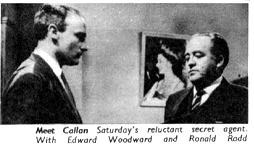
The music used as the show's theme, which was introduced in the original play immediately following the Armchair Theatre intro theme, was a library piece that also featured in other productions at the time. It was composed by Jack Trombey whose real name was Jan Stoeckhart, from Holland. The piece has been listed on compilation albums alternately as A Girl in the Dark and A Man Alone.
Following the transmission of A Magnum for Schneider, the critic Kenneth Eastaugh, in his review, wrote: "William Shakespeare crossed swords with TV writer James Mitchell this weekend and, in terms of impact, Shakespeare lost... For I spy a first-rate spy ... His name is 'Callan' and his portrayal by Edward Woodward in the Armchair Theatre play, was the event of the weekend."
Viewers didn't have to wait too long for the full series of six episodes, which began at 9pm on Saturday 8th July 1967. The series took up from the conclusion of A Magnum for Schneider with Callan still in a red file. But as Hunter finds he has further use for him, he tricks or blackmails Callan into further assignments, always with his expendability in mind.
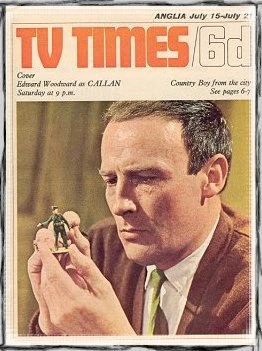
"They asked me how I was fixed to do another series and I said "I can't because Laurence Olivier has asked me to go to the National Theatre and do some lovely parts" - Edward Woodward
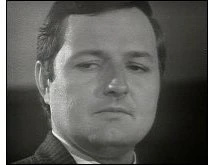
There is one major cast change for the first series of Callan from the original Armchair Theatre production: The role of Toby Meres. In the AT play, Meres, a public school bully who fancies himself as Hunter's Number Two, is played by Peter Bowles, later to become famous on British television in a number of lead roles but perhaps most famously as Richard DeVere in the BBC sitcom To The Manor Born. Bowles certainly had the right pedigree to play an upper class English schoolboy. Born in London, England, on 16th October 1936 his father, Herbert Reginald Bowles, was a chauffeur and butler at a stately home in Warwickshire, until he was seconded to work as an engineer at Rolls Royce upon the outbreak of World War II and moved the family to Nottingham. Peter Bowles attended Nottingham High Pavement Grammar School and then trained as an actor at RADA. He made his screen debut in 1959 and throughout the 1960s amassed a long line of smoothie villains and swarthy rogues in various ITV action dramas. However, there was a gentlemanly politeness about Bowles that didn't seem quite suited to the role of Toby Meres who was intended to be arrogant and vain as well as a vicious interrogator and callous killer with a sadistic streak, perhaps with ambitions to be section leader himself one day. When Hunter recalls Callan to active duty Meres' is clearly disgruntled, believing that Callan is "past it" and should have been disposed of a long time ago. The only thing that Meres has to hang on to is that he might get the chance to dispose of Callan himself. In the AT production, it is Hunter's intention that Callan should be found by the police at the scene of Schneider's murder and Meres is dispatched to ensure that is so. But Callan turns the tables on Meres and leaves him unconscious in Schneider's home just minutes before the police arrive. It is this act that gets Callan a red file.
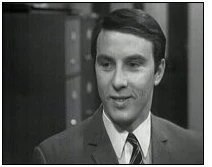
When the first six-part series was cast, Peter Bowles was replaced by Anthony Valentine. Born on 17 August 1939 in Blackburn, Lancashire, Valentine worked as a child actor for the BBC, and appeared at the age of 10 in the film No Way Back and aged 12 in The Girl on the Pier. He appeared in the 1955 version of The Children of the New Forest and landed the role of Harry Wharton from 1957 to 1958 in the BBC Children's adaptation of Billy Bunter. He attended the Valerie Glynne School and Acton County Grammar School. In 1958 he appeared opposite Sir Laurence Olivier and Irene Worth in John Gabriel Borkman as part of the ITV Play of the Week series. What Valentine brought to the role of Toby Meres was an air of cold detachment and superiority. He was the type of person who smiled as he killed and enjoyed every aspect of that act.
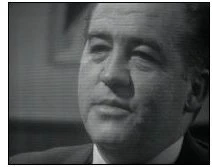
In both the play and the series, the role of Hunter was taken by Ronald Radd. Born on 22 January 1929, Radd began his acting career on stage in the Alexandra Theatre in Birmingham in the early-1950s, along with the likes of Leslie Sands and Edward Mulhare. By 1954, Radd had graduated to the West End, where he was a most unlikely co-star with Kenneth Williams in two different productions in the Apollo Theatre in The Buccaneer and The Boyfriend. Radd broke into television in Ordeal by Fire in 1957 as a dastardly Frenchman, a single play involving Joan of Arc (played by Elizabeth Sellars) with Peter Wyngarde and Patrick Troughton with whom he later starred in the 1958 BBC production of A Tale Of Two Cities. Radd's next few TV credits took place across the Atlantic and he made a number of appearances in the CBC production The Shari Lewis Show between 1960 and 1963, and in 1960 appeared in the production of Eugene O'Neill's The Iceman Cometh directed by Sidney Lumet.
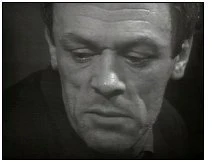
The role of Lonely went to Scottish born actor Russell Hunter. Born Russell Ellis in Glasgow on 18 February 1925, he spent his early years with his maternal grandparents in Lanarkshire because his father, who was unemployed, and his mother, who was a cleaner, were too poor to support him. He was reunited with his parents when he was 12, and did some acting as an amateur while serving an apprenticeship in a Clydebank shipyard. Turning professional in 1946, under the stage name Russell Hunter, he acted at Perth Rep and the Citizens' Theatre, Glasgow, and was due to appear in Sean O'Casey's play The Plough and the Stars at the first Edinburgh Fringe Festival, in 1947, when the Arts Council withdrew funding. In spite of this last-minute setback the play went ahead becoming part of the inaugural Edinburgh Festival Fringe. The posters advertising it were altered from "Sponsored by..." to read "Eliminated by the Scottish committee of the Arts Council."
Hunter worked in repertory theatre and Scottish variety before making his film debut in Lilli Marlene (1950) and later joined Peter Hall's Royal Shakespeare Company. Pantomime was a firm favourite of Hunter's, and he joined the company that performed Howard and Wyndham's Wish For Jamie, the first original Scottish panto, to public acclaim in 1960. Five years later, he took the lead in Victor Carin's Servant O' Twa Maisters, which opened the Royal Lyceum theatre in Edinburgh. His portrayal of Lonely was described by one critic as "a model of character acting." About playing the character, Hunter said; "I take more baths than I might have playing other parts. When Lonely was in the public eye I used only the very best toilet water and a hell of a lot of aftershave."
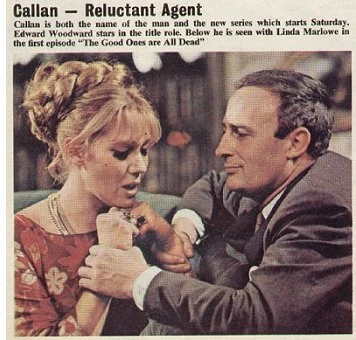
For the series, a new opening sequence was filmed showing a darkened brick wall illuminated by a single swinging light bulb. As the bulb swings back and forth like a pendulum, it illuminates Callan's face. A single gunshot rings out and the light explodes in a shower of glass. A still of Callan's face appears before another single gunshot shatters the picture (glass-like) at Callan's forehead (this was silent with the sound of a second bullet only being added from Series 2). For the first series the opening theme came in after an (approximate) two-minute opening scene. Series One's episodes were 1: The Good Ones Are All Dead (8th July 1967). 2: Goodbye, Nobby Clarke (15th July 1967). 3: The Death of Robert E Lee (22nd July 1967). 4: Goodness Burns Too Bright (29th July 1967). 5: But He's a Lord, Mr Callan (5th August 1967). 6: You Should Have Got Here Sooner (12th August 1967). As was the norm for that period, Callan was recorded on monochrome videotape, with filmed inserts used for location work. Of all Season One episodes, only numbers 1 and 6 exist in the archives and were released on 9 December 2009 by the now defunct Network DVD company in a compilation box-set, which included the original AT production. called Callan - The Monochrome Years, it was a hugely successful release for the company.
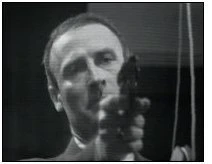
Following the transmission of Series One, ABC Television, who had the franchise to broadcast at weekends (Associated-Rediffusion having the rest of the week), were forced, like all the other Commercial Television companies, to reapply for new contracts for the right to broadcast on ITV. ABC had high hopes of retaining their franchise, but instead, the weekend was allocated to the London Television Consortium who became publicly known as London Weekend Television. The ITA proposed a "shotgun marriage" between ABC and Rediffusion much to the latter's annoyance. Rediffusion tried to derail the process, but the ITA threatened to give the licence solely to ABC. In the end, Rediffusion had no choice. The companies merged, with ABC being given 51% of the voting shares, putting them in control of the new franchise, which was named Thames Television. The new channel began broadcasting on Tuesday 30th July 1968. Callan did not return to screen until almost six months later, on 8 January 1969, 17 months after Series One ended. It may have been the merger that delayed the second series, but Edward Woodward remembered that there was another reason: "They asked me how I was fixed to do another series and I said "I can't because Laurence Olivier has asked me to go to the National Theatre and do some lovely parts" and they said okay, let us know when you're free. So I finished eighteen months later and they called me up again and said how are you fixed now? And I said; "fine" so we went ahead and did the next series. And that's the way it was."
Series 2 saw Callan move from its previous Saturday night slot (due to Thames weekday franchise) to Wednesday night at 9pm. The first face seen at the start of Series Two is Hunter's secretary, Liz. In the original play, Hunter's secretary is only heard on the phone. Her voice for the AT production was supplied by Judy Champ. Lisa Langdon supplied the voice in Series One, but was not seen on screen and was only known as "Secretary." But from Series Two onwards Langdon was seen on camera. Born in Sweden, Lisa Langdon emigrated to the UK in 1958. Apart from Callan, she appeared in one episode of Mr. Aitch, the sitcom starring Harry H. Corbett and a 1967 episode of Dixon of Dock Green. In 1968 she was the storyteller on several editions of Jackanory, telling stories from Sweden which she translated.
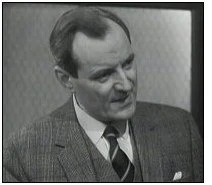
In the opening episode of Series Two, The Section gets a new 'Hunter' (the Colonel title being dropped). Hunter number two was played by Michael Goodliffe. Lawrence Michael Andrew Goodliffe was born on 1 October 1914, in Bebington, Cheshire (now Merseyside). His father was a vicar and Michael was educated at St Edmund's School, Canterbury, and Keble College, Oxford. He started his career in repertory theatre in Liverpool before moving on to the Royal Shakespeare Company in Stratford upon Avon. He joined the British Army at the beginning of World War II, and received a commission as a Second Lieutenant in the Royal Warwickshire Regiment in February 1940. He was wounded in the leg and captured at the Battle of Dunkirk and incorrectly listed as killed in action. He even had his obituary published in a newspaper while he was held captive as a prisoner of war in Germany. Whilst in captivity he produced, acted and wrote a number of plays and sketches to entertain fellow prisoners. After the war he resumed his professional acting career. As well as appearing in the theatre he worked in film and television. He appeared in The Wooden Horse in 1950 and in other POW films. His best-known film was A Night to Remember (1958) in which he played Thomas Andrews, builder of the RMS Titanic. He also appeared with John Thaw and James Bolam in the 1967 television series Inheritance. As Series Two begins, Callan is still not employed by The Section, except on an ad hoc freelance basis. Hunter is considering whether or not Callan is a liability, but his quick thinking and reflexes saves Hunter's life in the first episode, and Callan's services are retained. However, Callan's life-saving act turns out to be only a temporary reprieve for Hunter, who is killed in episode 5.
Episode 6 sees Callan and Meres dispatched to the border of East Germany, where they have to cross beyond the Iron Curtain to rescue an agent. The agent, a former colleague of Callan's is to be the new Hunter. Derek Bond played Hunter number three. Born Derek William Douglas Bond on 26 January 1920, he attended Haberdashers' Aske's Boys' School in Hampstead, London. He saw active service with the Grenadier Guards in North Africa during the Second World War, for which he was awarded the Military Cross. He spent the last few months of the war in a Bavarian POW camp. His acting career began in 1938 with the Finchley Amateur Dramatic Society. This secured him a number of dramatic and light comedy roles and made a lasting impression in the title role of the Ealing Studios production of Nicholas Nickleby (1947). In the last dramatic episode of Series Two, Callan is captured by foreign agents and brainwashed into believing that Hunter is a traitor. When they allow him to escape, he returns to Section Headquarters and kills Hunter with a single gunshot to the heart, before being shot himself by Toby Meres. As the episode ends, it is not certain whether Callan will survive.
Series Two's episodes were: 1. Red Knight, White Knight (8th January 1969): 2. The Most Promising Girl of Her Year (15th January 1969): 3. You're Under Starter's Orders (22nd January 1969): 4. The Little Bits and Pieces of Love (29th January 1969): 5. Let's Kill Everybody (5th February 1969): 6. Heir Apparent (12th February 1969): 7. Land of Light and Peace (19th February 1969): 8. Blackmailers Should Be Discouraged (26th February 1969): 9. Death of a Friend (5th March 1969): 10. Jack-On-Top (12th March 1969): 11. Once a Big Man, Always a Big Man (19th March 1969): 12. The Running Dog (26th March 1969): 14. The Worst Soldier I Ever Saw (2nd April 1969): 15. Nice People Die at Home (9th April 1969): 16. Death of a Hunter (16th April 1969). Of these, only 9 survive: Episodes 1, 2, 4, 5, 6, 9, 14, 15 and 16. These surviving episodes complete the compilation box set called Callan - The Monochrome Years.
According to Edward Woodward, it was a mutual decision to finish the series after the fourth season.
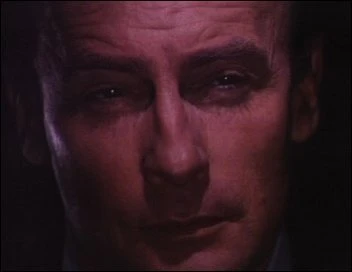
Series Three of Callan began on 8 April 1970. Like most other new series of that period Thames decided to film this series in colour, no doubt keeping one eye on international sales. Picking up twelve months after he had been almost fatally shot by Toby Meres, we meet Callan the day before he is to be discharged from hospital. Although The Section has looked after Callan and exonerated him from all blame in the assassination of Hunter, there are still grave concerns regarding his mental state and the security risk he poses. Hunter dispatches an agent to the hospital to make contact with Callan. But it is not Toby Meres. Perhaps fearing there may be old scores to settle, Meres has been sent to work in Washington for the Americans (Anthony Valentine had in fact 'defected' to the BBC to make the series Codename). In his place is a slightly younger man who is perhaps a little too brash for his own good: James Cross, played by Patrick Mower.
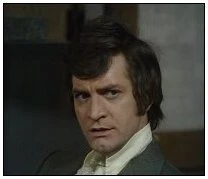
Patrick Mower was born in Oxford to a Welsh father and English mother. Mower used to run a youth club for the local church in Oxford before he married, while he was training to be an engineering draughtsman. He told the TV Times in 1972 that he had two brothers, one an arms dealer, married to a Persian: the other in the Australian outback with five children and more to come. Mower later discovered that his father had been married before, and he had three half-sisters in Wales of whose existence he had been unaware. In his 2007 autobiography, Mower states that having believed for years that his year of birth was 1940, he discovered that his birth was not registered and he may have been born on 12 September 1938 or 1939. He finished his apprenticeship to please his father, a miner who had all the hard times in the Thirties and decided to get out before he got silicosis like his brother. So he went to work in a pressed steel factory in Oxford and insisted Patrick learn a trade. "I went to the Royal Academy of Dramatic Art on a scholarship when my apprenticeship was over. My father died two years after seeing me reach the pinnacle."
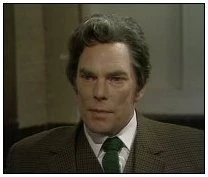
Callan's actions in the final episode of Series Two also meant The Section needed a new Hunter. William Squire, born April 29 1916 in Neath, South Wales, became an actor of stage, film and television. As a stage actor, Squire performed at Stratford-upon-Avon and at the Old Vic, and notably replaced his fellow-countryman Richard Burton as King Arthur in Camelot at the Majestic Theatre on Broadway. His screen roles included Thomas More in the 1969 film version of Maxwell Anderson's play Anne of the Thousand Days. In a set of Encyclopaedia Britannica-produced educational films about William Shakespeare's Macbeth, Squire played the role of Macbeth. This was in keeping with his long career as a Shakespearean actor, which included roles in the classic 1960s TV series, An Age of Kings.
Low on reliable agents, the new Hunter would rather have a fighting fit Callan back in The Section than damaged goods left to his own devices and a constant concern to him. So he slyly sets Callan a task to prove his worth. On the advice of The Section's interrogative psychologist (Snell - actor Clifford Rose), the only way Callan will be able to prove himself is to defy his new boss, and so Hunter uses Callan's Achilles heel, his odorous friend Lonely, as the bait to hook his prize. Having been 'fit up' by The Section, Lonely is being held on remand for the offence of larceny which, given his previous criminal record will almost certainly result in a long term of imprisonment. Callan blackmails The Section into paying out Lonely's £3,000 bail security, but not before threatening to kill Hunter. It's at this point that Hunter knows he has his man back. Squires' Hunter was far more cold and ruthless than his predecessors and his marksmanship, demonstrated several times in The Section's armoury, suggests that he had experience in the field rather than being a mere civil servant. It's in this episode that we learn that David Callan is not our anti-hero's real name. When recognised by a former army colleague Callan tells him "I've changed my name since then."
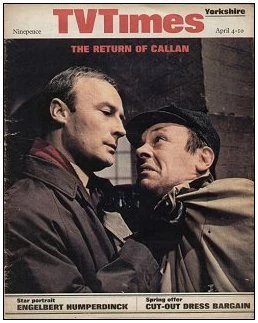
Russell Hunter returned as Lonely and Clifford Rose reprised his role as Snell. Also returning was Lisa Langdon as the ever-reliable Liz. Except in one particular episode, Liz proves less than her reliable self when she goes missing from The Section - an act that causes Hunter great concern. The character of Liz is much expanded in this episode. The sole survivor of a village in Poland that was a centre for the resistance during the Second World War, when the Germans discovered it they wiped it out killing every man, woman and child, three-year old Liz escaped when her father managed to hide her behind a bookcase, just before the SS shot him, his wife and their three sons. Liz stayed hidden for two days until discovered by some looters. For the next nine years she ended up in a succession of refugee camps. Then an English couple called March adopted her. Her adopted father worked as a cipher clerk in the foreign office. He had been involved in Polish underground liaison during the war and as such had come to notice of The Section, during the years of the Cold War, as a possible security breach. Tragedy struck when the March's were killed by a drunk hit-and-run driver. Liz, fluent in Polish, Russian and German was just what the Section wanted. As Hunter says: "No relations. No one she loved. No one who could be used against her. Or against us." Liz has knowledge and access to files that make her a potential target for any rival foreign power. And as such, she is permanently in a red file.
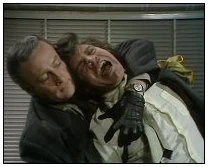
As Series Three progresses Callan's reputation and standing within The Section grows. This was unfortunately lost on original transmission as Thames Television showed the series episodes out of sequence. It wasn't until the Network DVD release (May 2010), where the episodes were reordered chronologically, that the full impact of Callan's growing importance to The Section could be fully appreciated. The transmission order for Series Three is as follows: 1. Where Else Could I Go? (8th April 1970): 2. Summoned to Appear (15th April 1970): 3. The Same Trick Twice (22nd April 1970): 4. A Village Called 'G' (13th May 1970): 5. Suddenly - at Home (20th May 1970): 6. Act of Kindness (27th May 1970): 7. God Help Your Friends (3rd June 1970): 8. Breakout (10th June 1970): 9. Amos Green Must Live (24th June 1970). The correct order for these episodes is: 1. Where Else Could I Go? 2. Summoned To Appear. 3. The Same Trick Twice. 4. Act of Kindness. 5. Amos Green Must Live. 6. God Help Your Friends. 7. A Village Called 'G'. 8. Suddenly At Home 9. Breakout.
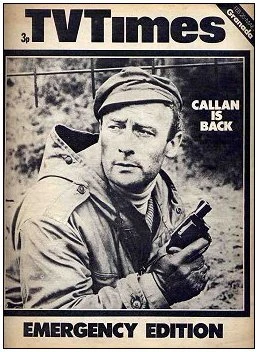
Viewers had to wait until April 1972 for the fourth (and final) series of Callan. The new series was featured on the front cover of the February 26th issue of the TV Times - a so-called Emergency Issue. At that time Britain was gripped in political unrest. With the economy threatened by runaway inflation, the Government had announced a cap on pay rises which resulted in industrial action by the country's coal miners. The effect was that commercial users of electricity would be limited to three specified consecutive days' consumption each week. TV Times also fell foul of this three-day week policy and, at times, was only able to print a smaller edition of the magazine in black and white. On the week that Callan started they offered the following apology: 'We're sorry that this edition of TV Times could not be published in its usual form, but power cuts took their toll of our printing arrangements. We have cut the price as well as the number of pages. Callan is back...and there's another reason we're sorry we have to present you with this emergency edition. We were to have made a very special announcement involving Callan and Edward Woodward. (Callan had come out top of a TV Times readers' poll as Most Compulsive TV Character (male) while Woodward himself was voted Best TV Actor - the announcement was held over until the next full edition of TV Times on March 11th). The edition did, however, manage to feature a small article on the actress Queenie Watts who returned to the series, after a brief appearance in Series Three, as Lonely's aunt.
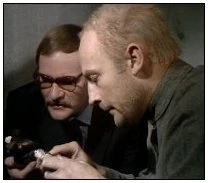
Series Four began on Wednesday 1 March 1974 at 9pm. The Section has buried Callan who is, in fact, being held prisoner in Russia. A job in East Berlin had gone wrong with the result of Callan being arrested by the police and turned over to the KGB. He has been held captive for almost six weeks and slowly interrogated with the use of mind-bending drugs. He is almost a broken man, but still refusing to disclose anything other than the most basic of information to the Russian doctor (the KGB's equivalent of The Section's doctor Snell - played by Julian Glover) charged with breaking him down completely. As his captors prepare to give Callan a massive dose of the truth drug that could possibly destroy his mind, a deal is done with the British Intelligence Service to exchange him for a captured Russian operative - Richmond (T.P. McKenna). It's a deal that Hunter disapproves of, but one that is ordered by his superior, Bishop (Geoffrey Chater). Once he is returned to England, Callan makes it quite clear that he wishes to resign as a field operative. The Section now sees Callan as a liability. The Russians know his face and he is now their prime target. However, as for retirement: The Section has other ideas. Having proved his worth as their best agent and a master tactician, Callan is offered the role of Head of Section: The new Hunter. With no other options, and the threat of being red-filed once again, he unwillingly accepts. But Callan's tenure as Hunter is a rocky one, and it culminates in the death of James Cross, the return of the previous Hunter, and the return of Callan's old partner in crime and adversary, Toby Meres. The final three episodes of Series Four form a trilogy with the umbrella title of 'The Richmond File'. Ultimately, Callan defies Hunter, who threatens to finally break him.
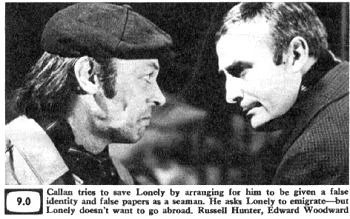
Series Four episodes were: 1. That'll Be the Day (1st March 1972): 2. Call Me Sir! (8th March 1972): 3. First Refusal (15th March 1972): 4. Rules of the Game (22nd March 1972) 5. If He Can, So Could I (29th March 1972): 6. None of Your Business (5th April 1972): 7. Charlie Says It's Goodbye (12th April 1972): 8. I Never Wanted the Job (19th April 1972): 9. The Carrier (26th April 1972): 10. The Contract (3rd May 1972): 11. The Richmond File: Call Me Enemy (10 May 1972): 12. The Richmond File: Do You Recognise the Woman? (17 May, 1972): 13. The Richmond File: A Man Like Me (24th May 1972).
According to Edward Woodward, it was a mutual decision to finish the series after the fourth season. James Mitchell felt he had written as many as he could (30 of the 43 episodes made - including the AT original) and a beckoning film career meant that Woodward no longer wanted to be tied to a long-running TV series. But he wasn't quite finished with the character of David Callan just yet. In 1974 Callan transferred to the big screen. The movie is an expanded version of the original Armchair Theatre presentation and closely based on James Mitchell's 1969 novelisation A Magnum for Schneider, later released as Red File for Callan (March 1971) and Callan (August 1974). Mitchell also wrote three other Callan books - Death and Bright Water (1974), Smear Job (1975) and Bonfire Night (2002).
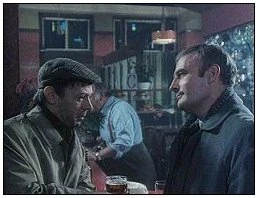
For the movie there were numerous cast changes. Only Woodward, Russell Hunter (Lonely) and Clifford Rose (Snell) reprised their TV roles. Veronica Lang was Hunter's Secretary, called Jenny. Hunter was played by Eric Porter and Toby Meres by Peter Egan. Both actors gave fine performances playing roles already established on television but without delivering the same cold and threatening manner. This, and a far less atmospheric musical score (by Wilfred Joseph) let down an otherwise decent attempt at bringing Callan to the cinema, and thereby an international audience. Seven years later, in 1981, Callan and Lonely were reunited for a one-off 90-minute special, entitled Wet Job. Callan has been retired and running a gun shop under the name 'Tucker' for the last ten years. But the Section has one more job for him. Edward Woodward and Russell Hunter reprised their roles, with Hugh Walters taking on the part of the latest Hunter.
Apart from James Mitchell, a number of other writers worked on various episodes of Callan. These included Robert Banks Stewart, Trevor Preston and William Emms. Producers included John Kershaw, Lloyd Shirley and Terence Feely, but the most prolific of these was Reginald Collin who produced 35 episodes between 1969 and 1972. Reginald Collin was born in 1927, in East London. The family moved to Harrow shortly after the start of the war. Leaving school during the height of the Blitz, his first job, at the age of fourteen, was that of lab boy at the Westminster Hospital in London. A month after the war finished he was called up for National Service. Upon his eventual discharge he won a scholarship to The Old Vic Theatre School. Weekly Rep followed and then some years directing pantomimes and summer shows. In 1959 he was asked to join ABC Television becoming a director in the Features Department where he created the arts programme Tempo. He then moved to the Drama Department. For Callan he received the award of Best Drama Producer 1969, and this was later followed by two nominations from BAFTA and awards for Services to the Industry. He was also awarded a Fellowship by The Royal Television society for "Recognition of an outstanding contribution to the furtherance of television."
After Callan:
James Mitchell returned to his native Tyneside to create When the Boat Comes In (1976-77, 1981), which followed the trials and tribulations of a former army sergeant, Jack Ford, and the Seaton family in South Shields between the wars. The drama's writing and production values, including scenes of crumbling slums, succeeded in portraying the hard times endured by the urban poor. Mitchell wrote novels about the characters featured in Callan and When the Boat Comes In, and lived in London at the time of his greatest television successes. He later returned to the North-East to live in Jesmond. James Mitchell died in Newcastle upon Tyne on 15th September 2002.
Ronald Radd - Hunter number 1, made a guest appearance in the first episode of the final season of Callan. He is seen sitting in church as the vicar delivers the eulogy for Callan at his 'funeral.' In 1969 he appeared in John Huston's The Kremlin Letter. Radd worked alongside actors such as a very young Robert Redford and Jason Robards. Radd also appeared in the NBC production of The Tempest playing the role of the drunkard Stefano, alongside acclaimed actors such as Richard Burton who portrayed Caliban and Maurice Evans, star of many Hallmark productions later. In 1971 he was nominated for Broadway's Tony Award as Best Supporting or Featured actor. He died in Toronto, Ontario, Canada of a brain haemorrhage in 1976 aged 47.
Lawrence Michael Andrew Goodliffe - Hunter number 2, suffered from depression and had a breakdown in 1976 during the period that he was rehearsing for a revival of Equus. He committed suicide a few days later by leaping from a hospital fire escape, whilst a patient at the Atkinson Morley Hospital in Wimbledon, London.
Derek William Douglas Bond - Hunter number 3, was President of the Actors' Union Equity for a tempestuous period during the 1980s. In 1984, because of his intention to perform in South Africa, the country's apartheid system was the cause of a UN backed cultural boycott, a motion urging Bond to resign was proposed, but rejected, in July 1984. He later resigned when a ban on members working in South Africa became union policy after his return to the UK. He died 15 October 2006, in London.
Anthony Valentine's other TV appearances include Colditz, Space: 1999, Minder playing Maurice, a professional gambler, Tales of the Unexpected, Bergerac, Robin of Sherwood, Boon, Lovejoy, The House of Elliott, The Bill and New Tricks. He also narrated the three Wildlife Explorer documentary films & played a South London thug in the cult classic film Performance. Later television work includes an episode of Agatha Christie's Poirot, a further episode of The Commander in which he reprises his role of Commissioner Edward Sumpter and an episode of the popular series Heartbeat. Other television roles are as Nuremberg Prison Commandant Burton C. Andrus in the 2006 BBC docudrama Nuremberg: Nazis on Trial and as Jimmy "The Gent" Vincent in ITV's The Last Detective. In September 2009 he joined the cast of the British soap Coronation Street as a character called George Wilson. This was his last television role and he passed away on 2 September 2015, aged 76 years.
William Squire - Hunter number 4, went on to play Sir Daniel Brackley in 12 episodes of the TV series Black Arrow in 1974, Sir George Fielding in 10 episodes of The Venturers in 1975 and was the voice of Gandalf in the 1978 animated version of The Lord of the Rings. He also appeared in the 1979 Doctor Who serial The Armageddon Factor. In 1967 William Squire married the actress Juliet Harmer, who appeared in Adam Adamant Lives! He died in London on 3 May 1989. There is a park bench on Hampstead Heath dedicated to him.
Patrick Mower caused something of a stir when his character James Cross was killed off in the series. Distraught female fans jammed the ITV switchboard with phone-calls. The following night he was hurriedly booked onto Eamonn Andrews' Today programme. He said he enjoyed his time on the show but, afraid of being typecast, wasn't sorry to go. Following Callan he went on to appear as DCI Tom Haggerty in Special Branch alongside George Sewell, and DS Steve Hackett in the police series Target. Since 2000 he has been starring in the ITV soap opera Emmerdale.
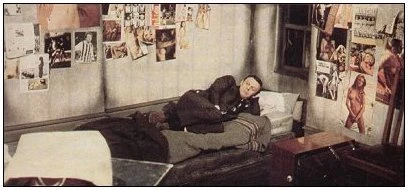
Russell Hunter acted in the Hammer horror film Taste the Blood of Dracula (1970) and took the roles of Crumbles, Dr Fogg and Dr Makepeace in an ITV production of Sweeney Todd (1970), He also appeared in the British comedy film Up Pompeii (film) (1971) as the Jailor. Hunter's other TV credits include The Sweeney, Doctor Who, Farrington of the F.O., The Bill, A Touch of Frost, sitcoms Rule Britannia (1975) as the Scotsman Jock McGregor and shop steward in The Gaffer (1981-83), and his last ever TV appearance, in the BBC drama Born and Bred. In his last years he reprised his Doctor Who role for a series of audio plays released on CD, Kaldor City. He also appeared as different characters in the pilot and series of the BBC sitcom Rab C. Nesbitt. Although in the advanced stages of cancer, Hunter's last theatrical stint was in the Sidney Lumet play 12 Angry Men at the Edinburgh Festival Fringe, with which he had remained inextricably linked. Despite being ill, Hunter received positive reviews for his appearances in the feature film American Cousins late in 2003 and as a priest in the film Skagerrak. In November, American Cousins, Hunter's last movie role, received the Special Jury Prize at the Savannah Film Festival in the United States, ending a career spanning six decades. Russell Hunter died on February 26th 2004, aged 79, at Edinburgh's Western General Hospital of lung cancer.
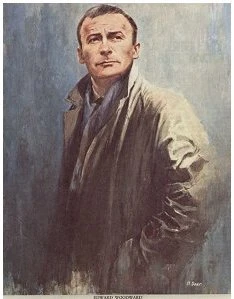
Edward Woodward's portrayal of the cynical secret service agent Callan, bought him worldwide critical acclaim. In the 1980s he went to America to star in The Equalizer, as Robert McCall, a former secret service agent for "The Company" (the CIA) who had turned to working as a private investigator. Set in Manhattan, the series was particularly popular in the United States where Woodward won a Golden Globe award for best actor in a dramatic television series in 1987, and was nominated five times for an Emmy. But a gruelling work schedule meant that Woodward was working 18-hour days, subsisting on a daily diet of junk food and 100 cigarettes. On his return to England he suffered a heart attack. He recovered, and in 1990 starred in another American television series, Over My Dead Body, in which he played a mystery writer solving real crimes. Although it proved to be short-lived, it led the following year to his much more successful ITV true crime drama documentary series In Suspicious Circumstances, in which he guided viewers through some of the most celebrated British crimes of the 20th century.
In the cinema, Woodward gave a notably moving performance in the title role of Breaker Morant (1980), the Australian film about a shocking injustice in the Boer War. On the big screen he also played Sergeant Neil Howie, alongside Christopher Lee and Diane Cilento, in The Wicker Man (1973); Commander Powell in Who Dares Wins (1982); Saul in King David; the Ghost of Christmas Present in A Christmas Carol; Merlin in Merlin and the Sword; Captain Haldane in The Young Winston; the racehorse trainer Josh Gifford in Champions; and Sergeant Wellbeloved in Stand Up Virgin Soldiers. Despite suffering from ill health, he starred as the Rev Frederick Densham in A Congregation of Ghosts. Woodward had a fine tenor voice, appearing on a number of occasions in The Good Old Days and making a dozen LPs. He was appointed OBE in 1978.
Woodward married Venetia Mary Collett in 1952, with whom he had two sons and a daughter, all of whom became successful actors. The marriage was dissolved in 1986, and he remarried in 1987, the actress Michele Dotrice, daughter of the actor Roy Dotrice and best known for her role as Betty Spencer in Some Mothers Do 'Ave 'Em.
In 1996 Woodward underwent triple heart bypass surgery, and in 2003 he was diagnosed with prostate cancer. He continued to appear on TV and film and gently lampooned his screen persona as an overly zealous member of a neighbourhood watch group in the comedy Hot Fuzz (2007). He had a brief role in The Bill in 2008, and in 2009 appeared in the British soap opera EastEnders, playing Tommy Clifford, a character harbouring a guilty secret. Edward Woodward died 16th November 2009.
In Callan, Woodward created one of the most memorable and iconic characters of all time, on British television. One critic wrote: "Woodward was that rarity in the entertainment world: one who specialised in nothing much, yet appeared to be especially talented in whatever he took on: villains, heroes, characters from melodrama and the musical comedy stage - all were tackled with a superb professionalism." His performance as the reluctant spy David Callan can be enjoyed again in two Network DVD releases Callan - The Monochrome Years and Callan - The Colour Years.
Published on February 17th, 2019. Written by Laurence Marcus. Callan Document: Recreated by Laurence Marcus from an article written for TV Times. Published on 4th April 1970 by James Mitchell Main article: Laurence Marcus April 2010. Sources of Research: Various original TV Times articles. Callan DVD Episodes. Wikipedia. http://www.bbc.co.uk/dna/h2g2/A4609749 Interview with Edward Woodward (2000) for Callan - the movie DVD release. This article created for Television Heaven.


